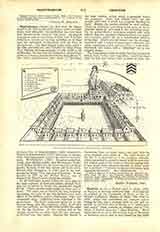

Chartier, ALAIN, a French poet., b. about 1390, at Bayeux; d. between 1430 and 1440. It is believed he studied at the University of Paris, as did his brother Guillaume, Bishop of Paris, who died in 1472. Alain was considered an eminent writer during his life, and a century later he was still regarded by the best men of letters as a “noble poet and orator” (Jean-Lemaire de Beiges), and as “the father of French eloquence” (Jean Bouchet). He is better known to us by the famous story of Margaret of Scotland, who is said to have kissed his lips while he was sleeping on a bench in her palace, to honor, she said, “the mouth which elicited so many virtuous words”. However pretty this story may be, it is only a legend, because Margaret of Scotland came to France only in 1436, and, according to the best authorities, Chartier was already dead. We know nothing of Chartier’s youth. His first work was “Le livre des quatre dames”, written not long after the defeat of Agincourt (1415). During the civil war and amidst the horrors of the English invasion, the poet devoted himself to allegorical and controversial love poems, in which he attained a considerable skill. Among them are: “Le debat de reveillematin”; “Le debat des deux fortunes d’amour”; “Belle dame sans merci”. These compositions were highly praised by contemporaries, but to a modern reader they appear lifeless and pedantic, a most complete example of the scholarly method which, at that time, tended to take the place of inspiration in French poetry. His “Breviaire des Nobles”, a code of the perfect knight, is better than his love songs. In 1417 Chartier was driven from Bayeux by the English invasion, and in 1418 from Paris by the Burgundian faction. He entered the service of Dauphin Charles, “King of Bourges”, afterwards King Charles VII, whom he served as private secretary most faithfully. He was entrusted with important missions for the king. In 1424 he went to Germany and in 1428 to Scotland.
Chartier is noteworthy as a prose writer, his prose being far superior to his poetry; his style is full of harmony, constantly enlightened by fine sentences, which are compared by Pasquier to those of Seneca. The “Quadrilogue invectif”, composed in 1422, is a dialogue in which France entreats nobility, people, and clergy, to unite their efforts to save her from invasion and civil war. The “Livre de l’esperance” or “Livre des trois vertus” is a moral dissertation. The “Curial” deals with the dangers and corruption of the courtier’s life. Because of the loftiness, courage, and dignity of his life, Chartier was entitled to teach moral lessons and to preach disinterestedness and Christian virtues. Chartier’s works were edited by Duchesne (Paris, 1617); Buchberger mentions an edition of his works by Montaiglon (Paris, 1861).
LOUIS N. DELAMARRE

